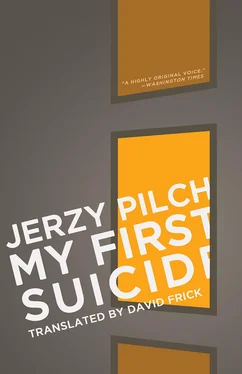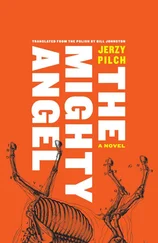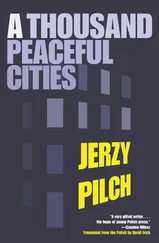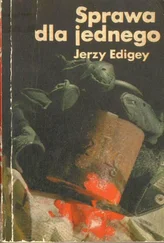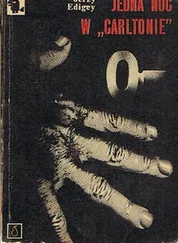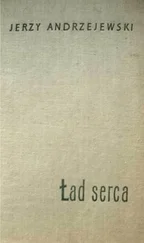“Now one of you bandits will follow me. I will give him the address in Katowice at which, after a certain time, the binoculars, like new, will be ready for pick-up. Whole and like new. Precisely the same. He, from whom you took them, he, from whom you borrowed them, and he, to whom you will return them, won’t notice a thing.”
She saved us, perhaps she even saved our lives, but — for the saving of life — she had a voice that was inappropriate. “Which of the bandits will follow me? Oh, of course, the more dangerous one. You’ll come,” she took Janek by the hand, “you’re the dangerous one, perhaps even menacing. You’ve got an evil look in your eyes. And you,” she turned to me, “you will wait here for your friend like a good boy. It won’t take long.”
With a fear that I didn’t know how to name — it certainly wasn’t fear for the smashed binoculars — I watched as the doubled shadow, hers and Janek’s, receded from me, as it climbed the steep slope in the direction of the Almira, as it vanished among other shades — then a completely dark and very long night ensued. Someone ran, or perhaps fled, through the center of Wisła, you could hear his panicky foot patter; then someone’s cry resounded, strangely joyous and triumphal; then the 11:23 train to Zawiercie gathered speed on the embankment. Had I fallen asleep? Was it the first time that I dreamed the best dream of my life, that I was walking through a gentle blizzard of butterflies?
I sat at the bridge table made of stone, at which deeply-tanned regulars played for unprecedented stakes, allegedly sometimes even for women. The surface of the water, permeated with suntan oils, gleamed like a roof that has just been tarred, or perhaps like the back of a Leviathan. It got colder and colder, my head kept nodding, and suddenly Janek stood next to me like a specter. I didn’t know whether half the night had passed, or half an hour; most certainly less than half the night, but more than half an hour. At The House of the Spa the dance was still going on, but it seemed to be drawing to a close. You could hear a slightly relaxed version of Rossini’s Tarantella —always toward the end, and always, when they were slightly relaxed, the Potulnik brothers played classical pieces from memory. Without a word, we set off home. When we were on the bridge, I asked:
“Do you have that address? When are we supposed to go there? To Katowice? Right?”
Janek remained silent; out of the corner of my eye I noticed the quick motion of his hand and a scrap of paper flying over the railing.
“Let it sail to the seas and the oceans?” I made sure I was understanding what he had done.
“Sail to all the seas of the world. To the Black Sea, the Yellow Sea, the White Sea, and the Red Sea,” he pronounced the colors like incantations.
Suddenly I felt an incomprehensible feeling of relief. It was as if a warm, Caribbean sea current had passed over me from head to foot. Nothing bad had happened, my God! The world was now missing one object — granted, it was exceptional — but what of it? Nothing! My God, that is nothing! It wasn’t certain whether Grandma would even notice the loss, whether she would ever look into the box where the binoculars were kept. She looks into the wardrobe in the back room two, three times a year, but into the box? When? I knew when. When a comet appears over Czantoria Mountain, or when the Big Dipper flies to pieces in the heavens. When would that be? Perhaps in twenty years, and perhaps never. Not only Grandma, not only we, but perhaps not even anyone in the whole world would live to see the next comet fly across the sky like a red-hot bulldozer.
“Did you fuck her?” I asked, when we were saying goodbye in front of our houses, and the question itself was proof of what soaring euphoria had seized me, and what mad boldness. I knew perfectly well that my friend couldn’t stand intimate questions. “Did you fuck her?”
“I didn’t feel like it,” Janek Nikandy replied, and he disappeared behind the gate to the dark gardens surrounding our houses.
VI
Last night, after several decades, I again dreamed of the butterfly blizzard. Back then they were yellow, today’s were white; this time my daughter Magda was with me in the dream, she held my hand, and I think she was coming to my rescue, because the number of butterflies was increasing, and they slowly began to suffocate me, but, all the same, it looked like it was going to be a beautiful death. All the more beautiful in that, just before dawn, in a flash of half-consciousness, it suddenly occurred to me that I am someone who understands the terrible randomness of the world. I suddenly saw that the world is a great field full of asymmetrically laid out campfires; you have to go incessantly from fire to fire; extinguish and kindle; go through the darkness, go through the light; someone tells of dangerous charges that could explode any moment. Suddenly it dawned on me that I knew how to write about — and how to take account of — the randomness, because other than that, there is nothing; how to show the campfires and the paths between them, and how to remember about the force of the charges planted everywhere, and how to liberate oneself from life for the sake of the spasm of love. I awoke slowly. The entire irrefutable transparency of the argument was vanishing. Grandma Pech was standing over my bed and saying something. She was repeating a sentence over and over that, at first, was completely indistinct, but then became more and more distinct. She said something, asked about something. It was almost half a century ago when I awoke for good, got dressed, traipsed into the kitchen. Nobody was there. I was tempted to run right over to Janek’s place without breakfast, but my hunger was stronger, and in those days the preparation of scrambled eggs didn’t drive me into such an abysmal depression as it does now. I got a frying pan covered with an eternal layer of grease from the pantry. I began to consider whether I would eat seven, or only five eggs. Grandma Pech was walking across the fieldstone-paved courtyard. Two steps behind her, Janek. Suddenly both of them — as if they were back in my dream — appeared in the kitchen.
“I wonder whatever could have happened to those binoculars?” Grandma asked in an amazingly cheerful tone.
“They fell into the river on us and got wrecked. Completely wrecked… It took us a long time to find them.” Janek produced the binoculars we had found under the bridge from inside his jacket, and at first he made a motion as if he wished to place them on the table, but then, with sudden desperation, he handed his greatest treasure to Grandma. Everything fell into place. I had stolen out of love for him, he was giving up his treasure out of love for me. Everything fell into place. Everything except for Grandma Pech’s reaction. She turned the old German ruin over in her fingers, and it was absolutely impossible that she would be taken in, that she would believe that this wreck, which had been lying in the water close to twenty years, had once belonged to Gustaw. This was completely out of the question, she was infallible in much more difficult matters, she infallibly recognized much more difficult objects, she couldn’t be taken in by such crude frauds. And yet. And yet, without a single word, or perhaps even with an almost inaudible sigh of relief, she turned on her heels and moved off into the depths of the house, and after a moment there reverberated the sound of the doors to the back room being opened and closed.
VII
After we moved to Krakow, I lost contact with Janek, and the bits of news about him that reached us were most strange. Supposedly, he didn’t study at all before his entrance exam to the blacksmiths’ technical college. This, in itself, wasn’t so strange. Janek generally knew everything even without studying, or he would catch up in a flash at the last minute — but this time he even let the “last minute” slide. The whole night before the exam, he sat in the attic and read old Cross Sections . It was incredibly stuffy; not even the night, not even the air over the gardens, which were going to seed, was cooler. In the morning, he went to take the exam, pale and as if in a fever, and — in short — he didn’t pass. Janek Nikandy didn’t get into the Blacksmiths’ Technical College in Ustroń! A gigantic sensation, perhaps even cosmic, but, finally, transitory, justifiable on account of health problems, although — to be honest — even confined to his bed he ought to beat all the healthy ones hands down. But after all, there’s luck in leisure. Everyone knew that he would pass the exam in a year, wherever he felt like it, and that he would make up for the year of delay whenever he felt like it. Except that in a year he didn’t take the exam anywhere, and he didn’t make up for any lost time, nor did he intend to make up for it. It was then I saw him for the last time in my life. We got off the Krakow train; there was a fantastic, rust-colored sunset, Janek stood on the platform. At first I thought he was waiting for someone, that perhaps by some miracle he had found out when I would be arriving with my folks, and that he had come out to the station. But he wasn’t waiting for me, or for anyone. He stood on the platform, and he was looking at the train that was just about to set off further toward Głębce. What’s new? Nothing. Playing soccer? No. Nothing — a russet sky over Czantoria Mountain.
Читать дальше
